Do Pigeons Eat Vegetables?
Whether you are a pigeon owner or a breeder, providing the right food to your pigeons is always a big concern for their health.
While their primary diet includes grains and seeds, there’s a lingering query among the enthusiasts: Do pigeons eat vegetables or not? Pigeons eat vegetables, but there’s a limitation on that. Not every type of vegetable is suitable for them. Pigeons mostly prefer vegetables that have soft leaves, like lettuce, spinach, dandelion greens, kale, cauliflower, etc.
Wanna know more? Keep scrolling. In this brief guide, we will understand the dietary habits of pigeons and explore whether they can digest all types of vegetables.
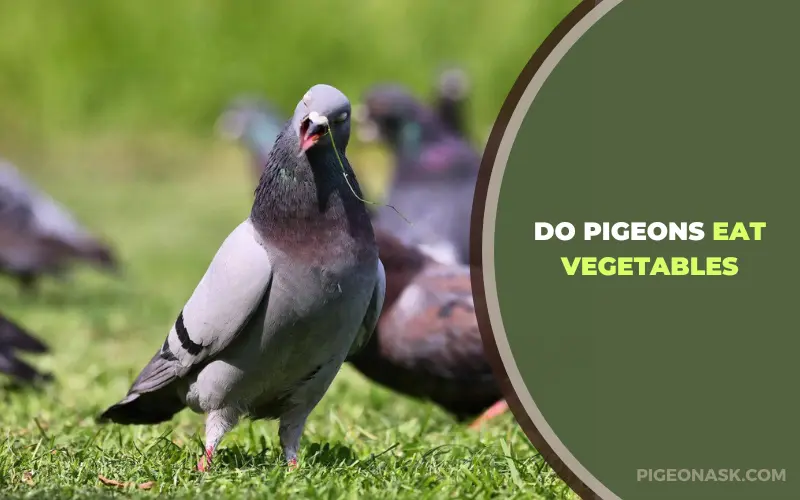
Plus, we will find out all the answers regarding vegetable consumption of pigeons and many more.
Looking for more articles about pigeon food:
Can Pigeons Digest All Types of Vegetables?
Pigeons, just like other birds, have a distinct digestive system, which differentiates them from mammals.
While they are primarily granivores (naturally seeds and grains eaters), pigeons have the ability to digest particular types of vegetables to a certain extent.
Their digestive system is capable of breaking down fibrous plant material. However, there is a limitation to the types of veggies. Beyond that, they can’t effectively process.
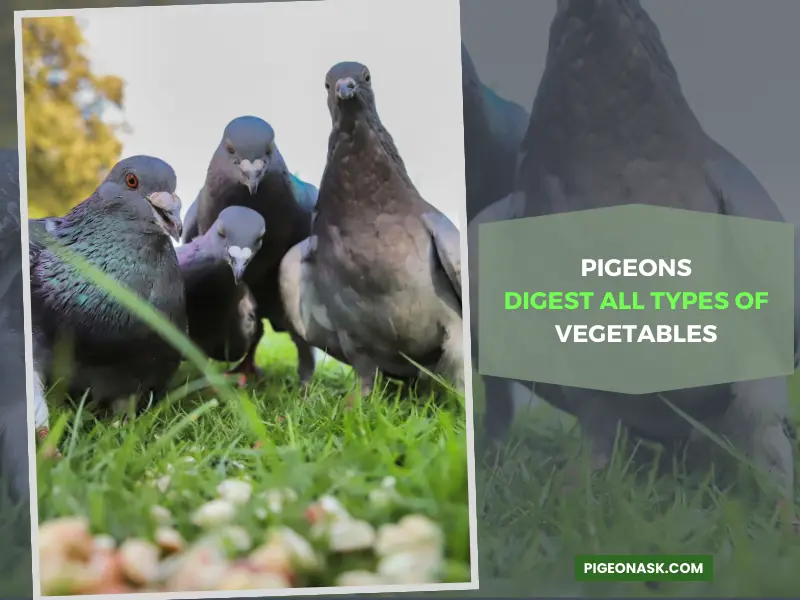
Especially leafy greens and softer varieties can be an essential part of their diet menu. However, extremely tough and fibrous vegetables are not well suited for their tummy.
For instance, raw carrots and large chunks of cruciferous vegetables can give them a hard time to digest.
See our in-depth “Pigeon Foods and Diet” article to learn what these urban birds eat. We cover their dietary habits and nutrition.
What Kind of Vegetables Do Pigeons Eat?
Pigeons have a flexible palate. They are not entirely against munching on veggies.
Though there are lots of veggies available, a captivating question always arises: Do pigeons prefer certain types of vegetables as their daily food?
Of course, they do. But here’s the catch: If you are treating your pigeons with vegetables, you need to make sure they are chopped enough into small pieces.
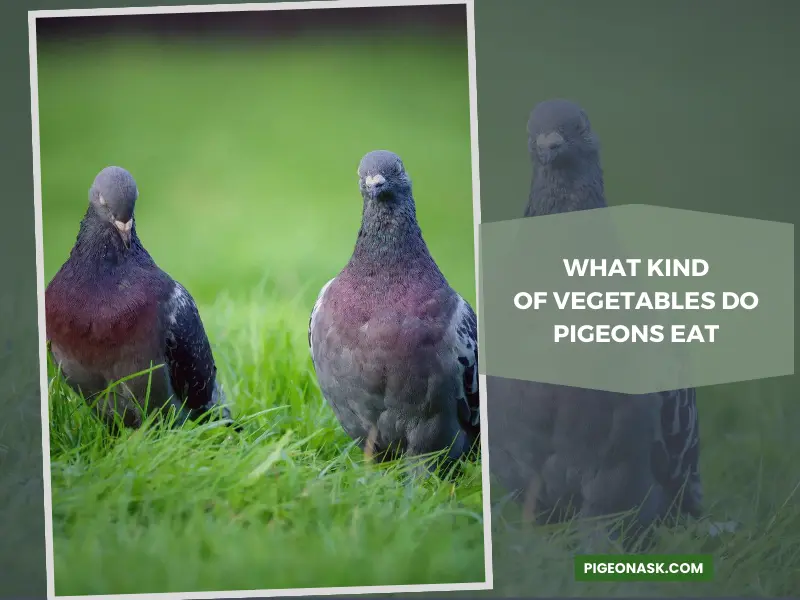
As pigeons lack teeth, the vegetables need to be in more manageable sizes so that pigeons can swallow them at a time without any difficulties.
Now, check out the following list of veggies that pigeons like to snack on –
- Lettuce
- Spinach
- Carrots
- Broccoli
- Dandelion greens
- Cauliflower
- Bell peppers
- Edamame beans
- Kale
- Potatoes
Oh! Let’s not forget about the corn, kernels, and snap peas. Whether they are fresh or cooked, these green goodies are a favorite to these adorable birds.
Plus, all these veggies not only taste yummy but also have a nutritional value, which ultimately boosts pigeons’ overall well-being.
Are There Any Health Benefits for Pigeons in Consuming Vegetables?
Vegetables undoubtedly provide essential nutrients to pigeons, which contribute to overall health and welfare.
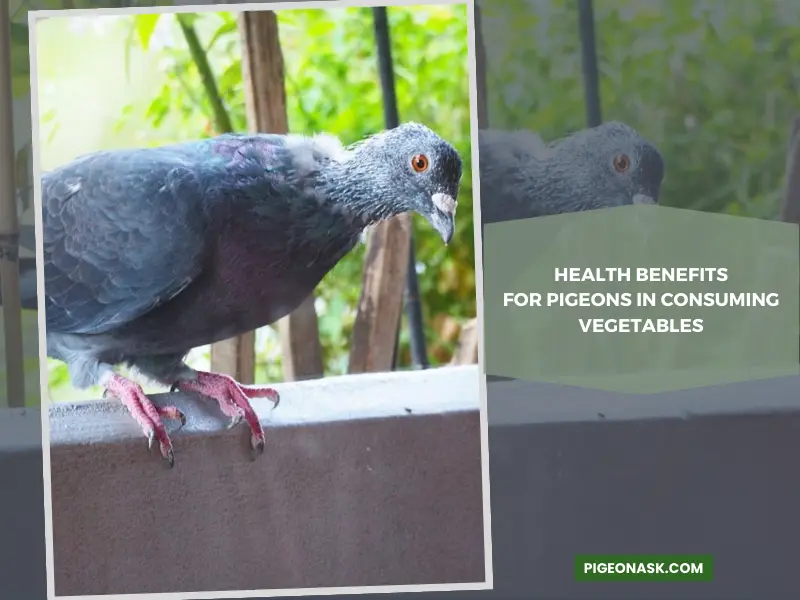
So, what are the potential benefits and nutritional value pigeons acquire?
1. Protein
Vegetables such as broccoli, spinach, potatoes, and sweet potatoes are excellent sources of protein. Muscle growth, muscle function, tissue repair, and feather development are highly dependent on this nutrient.
Though small insects and seeds meet the protein needs of pigeons in most cases, vegetables are a great alternative with fewer drawbacks.
2. Minerals
Essential minerals like iron and calcium are found in kale and broccoli. Whereas iron improves the oxygen transportation all around the pigeons’ body, calcium takes care of the bones.
Moreover, these nutrients have a significant role in developing a healthier immune system.
3. Vitamins
Vegetables are the powerhouse of vitamins. For instance, kale, collard greens, broccoli, spinach, cabbage, lettuce, carrots, and sweet potatoes are filled with various vitamins.
Consumption of these vegetables can easily meet the requirement of vitamins A, K, and C of your pigeons.
But what are the benefits of these vitamins? Well, vitamin A ensures healthier skin for your pigeons. Plus, it keeps the mucous membranes gutsy, which is found in pigeon’s nose, eyes, mouth, and sinuses.
On the other hand, vitamin C increases the metabolic function of your pigeons. And finally, vitamin K assures proper blood coagulation of these birdies.
Most vegetables are okay in terms of consumption for pigeons, but there’s always a question that makes the breeder and owners worried and that is: are there any vegetables that are harmful or toxic to pigeons if consumed in large quantities?
Yes, there are. Vegetables like onion, garlic, uncooked beans, mushrooms, and cassava are highly toxic and can cause fatal illness to your adorable pigeons.
4. Onion
Onion consists of the sulfur compound. So, whenever your birds munch on this veggie, it causes irritation to their mouth lining, crop, or esophagus, which can result in ulcers.
Moreover, onions can cause anemia by breaking the red blood cells of pigeons’ bodies.
5. Garlic
Allicin is a chemical component that is typically found in Garlic. This chemical can harm your pigeons pretty badly by inducing anemia and impotence.
6. Uncooked Beans
Uncooked beans are always a risky option, whether it’s humans or birds. It contains Hemagglutinin, which is toxic, especially for birds. So, if you are willing to share your beans with your pigeons, ensure they are well-cooked.
7. Mushroom
While mushrooms are an amazing source of vitamins and minerals, this veggie has toxic elements as well. Even esculent mushrooms can consist of agaritine, hydrazine, and formaldehyde, which can be deadly to your pigeons.
8. Cassava
Cassava contains a small amount of cyanide. So, treating your birds with a large quantity of cassava can really cause death. And remember, all parts of cassava are equally toxic.
Do Pigeons Eat Vegetables in the Wild?
In the wild, there’s a whole lot of options for the pigeons to consume. Most of the time, they stick to their regular diet menu, which includes grains, seeds, cereal crops, plant seeds, and peas.
But hunger and scarcity of their favorite food source can entice their regular food habit. In that situation, they are more likely to eat vegetables as an alternative.
Vegetables of the brassica family, which includes sprouts, cauliflower, cabbage, and broccoli, are the most preferable ones for pigeons in the wild.
Not because they are just tasty, but they are also softer to munch on and have significant nutrient values.
How Do Pigeons Find and Access Vegetables in Urban Environments?
Pigeons are incredibly adaptable. They have become skilled day by day at finding and accessing different food sources, including vegetables, in urban environments.
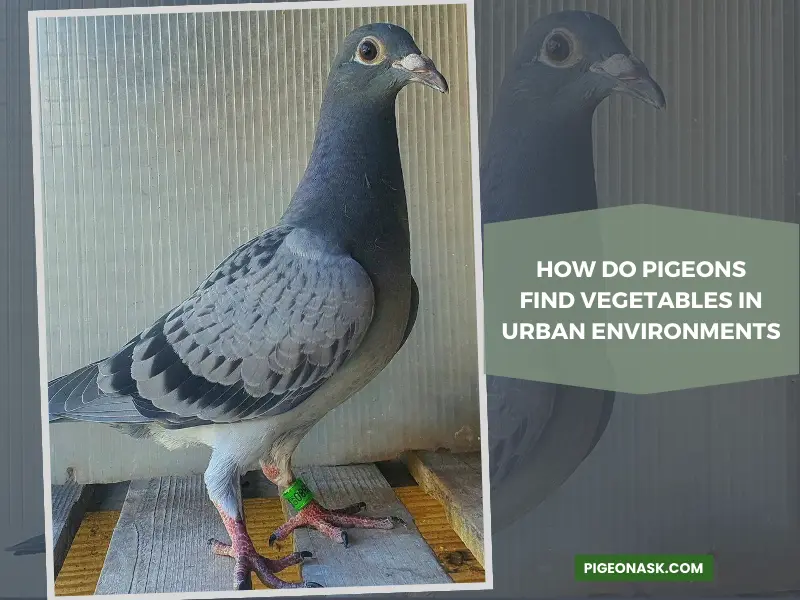
Here’s how they typically go about it −
Scavenging
Pigeons are natural scavengers. Through time, they have adapted themselves to take advantage of the human-created environment.
In urban areas, they scavenge around parks, plazas, and streets in search of discarded food, which includes vegetables. As they have amazing sights, they can easily spot food from a distance.
Open Air Markets and Cafes
Discarded vegetable scraps, such as lettuce leaves, fruit peels, and even breadcrumbs, are found in open-air markets and cafes where food is prepared and sold. Pigeons often take this as an opportunity to feed themselves.
Green Spaces
In many modern urban environments, there are green spaces like parks and gardens. Pigeons can spontaneously find natural vegetation and other plants there, which gives them easy access to eat.
Balconies and Rooftops
In urban areas, there is a shortage of greenery. So, people tend to cultivate vegetables and different plants on their balconies and rooftops. This excellent initiative provides a scope for pigeons to feed.
Feeding by People
City people sometimes intentionally feed pigeons and other birds. Although this practice can have unsorted opinions, it’s a way pigeons can access food directly from humans.
How Much Vegetable Should be Included in a Pigeon’s Diet?
When it comes to the number of vegetables in your pigeon’s diet, there is no exact answer for that.
The reason behind this is each pigeon has a different size, species, and activity. Typically, your pigeons’ diet should contain 50% of top-quality pellet or seed mix. And the other fifty should be a mix of different veggies and fruits.
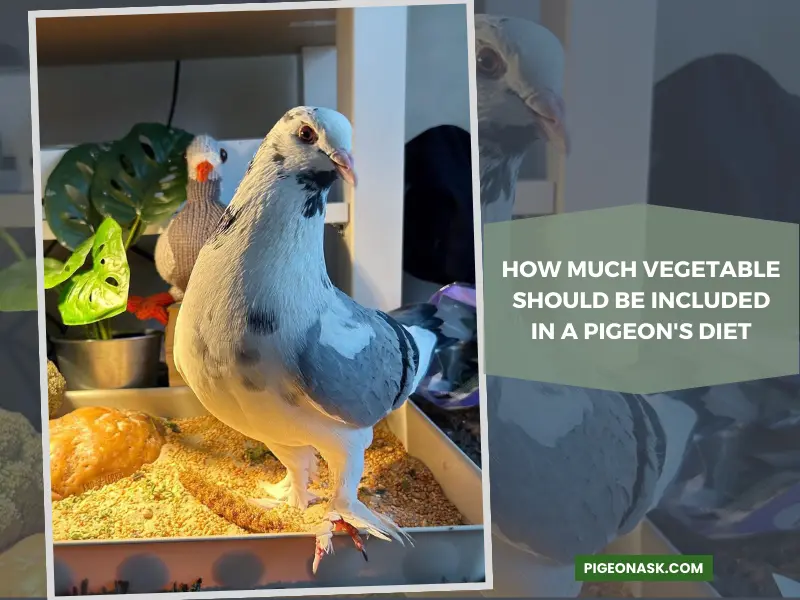
Remember, a pigeon’s diet should consist of 15-20% protein, 55-75% carbohydrate, and 5-10% fat.
So, at starting you can give your pigeon 2 tablespoons of seeds and 2 tablespoons of chopped vegetables and fruit.
At the end of the day, if you find there is still a snack left, you might reduce the amount a bit.
Frequently Asked Questions
01. Do pigeons eat tomatoes?
Usually, pigeons are not fond of tomatoes. But, depending on the deficiency of food, they eat tomatoes. If you want to give your pigeons tomatoes, ensure there are no stems, leaves, or vines attached because they are highly toxic.
02. Can pigeons eat uncooked rice?
Yes, pigeons feed rice, whether it’s cooked or uncooked. Many people think uncooked rice is not suitable for pigeons’ digestive system and it can cause illness. But that’s a myth.
Final Words
And there you have it, folks! Pigeons are time-serving feeders. They like to snack on whatever they find around their surroundings.
So, if you wonder whether pigeons eat vegetables? Absolutely! They do, but not on a regular basis. They would rather stick to their usual food habits until there is a lack of food.
Because of their natural instinct, they will nibble on vegetables eventually, but they are not exactly the broccoli-chomping champs.
Anyway, that’s all for today. Hopefully, you have your answer. We highly appreciate you staying with us. If you find this article helpful, please do follow us on Facebook, Twitter, and Pinterest.
Reference URL:
- https://www.healthline.com/nutrition/protein-for-vegans-vegetarians
- https://uihc.org/educational-resources/warfarin-your-diet-and-vitamin-k-foods
- https://zupreem.com/avian/toxic-foods-your-bird-should-never-eat/
- https://animals.mom.com/much-food-give-pet-pigeon-11605.html
